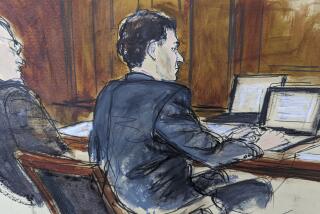Winans Adds to Testimony Against Brant : Claims Broker Flaunted Rich Life Style as Lure
- Share via
NEW YORK — Former Wall Street Journal reporter R. Foster Winans described in court Tuesday how a wealthy stockbroker lured him into leaking information about his stock-market column by flaunting a life style of exclusive clubs and restaurants, expensive cars and Long Island weekends.
In his second day on the witness stand, Winans, who once wrote the newspaper’s much-followed Heard on the Street column, gave his version of how he and Peter N. Brant, a former broker with Kidder, Peabody & Co., came to agree on a stock-trading plan based on advance details about the column’s contents and publication dates.
Federal prosecutors contend that the scheme constituted illegal trading based on insider knowledge. Winans, his roommate, David Carpenter, and Kenneth P. Felis, Brant’s fellow stockbroker at Kidder, Peabody, are on trial for mail and wire fraud, violations of securities laws and conspiracy. Brant has pleaded guilty to federal charges in the case.
Brant and Winans have each testified that the other suggested the plan. On Monday, a tearful Winans claimed that Brant had proposed the scheme. Again weeping at times, he expanded on that allegation Tuesday.
Limousine, Yacht
He testified that Brant invited him to an exclusive Manhattan tennis club and carried him in a chauffeured Cadillac limousine to the swank 21 Club for dinner. He told, too, of a weekend at Brant’s luxurious Long Island home, during which the stockbroker boasted of his antique yacht and showed him a collection of expensive cars.
Brant also told Winans, the ex-reporter testified, that he managed $70 million for his clients and was personally worth between $30 million and $40 million.
Winans, answering questions by his attorney, Don Buchwald, said he first met Brant because he was interested in doing a newspaper profile on highly successful brokers. They met several times at Brant’s office and at the Racquet & Tennis Club to which Brant belonged.
At these sessions, the subject was always Brant. But on Oct. 12, the two men again met at the tennis club. “Unlike our other conversations,” Winans recalled, “the conversation was about me. . . . He wanted to know my career goals, he wanted to know how long I intended to stay with the Journal. I told him that I hoped that now that I was writing the Heard on the Street column, opportunities would open up, possibly in the research department of a brokerage firm.”
Wasn’t Kidding
It was at that point that Brant told him: “If I knew what was in your columns beforehand, we could make a lot of money,” Winans said.
Buchwald asked Winans if it was a serious offer.
“He said it with a smile on his face,” Winans replied. “But there was something about the way he said it that I knew he was not kidding.”
Winans said he was nervous and did not answer. “I smiled. He kept pushing the point.”
They met four days later on a golf course. Winans said that he warned Brant that stocks could go down as easily as they could go up from information in the column and that he could not always guarantee that a column would be published when he said it would.
Most importantly, Winans testified in tears, “I told him this was the best job I ever had. I was not going to prostitute the column for him. If all I got out of it was to pay off some bills, I would be happy.”
More to Read
Inside the business of entertainment
The Wide Shot brings you news, analysis and insights on everything from streaming wars to production — and what it all means for the future.
You may occasionally receive promotional content from the Los Angeles Times.









